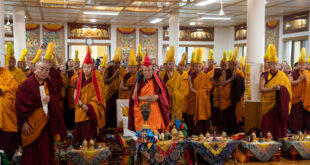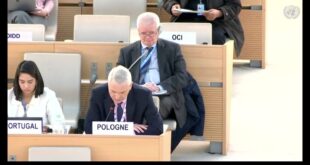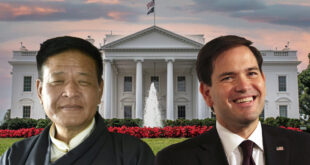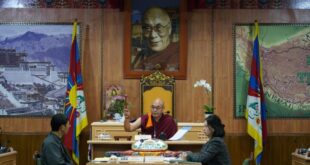October 14th 2013
Mexico City, Mexico 13, October 2013 – Immediately after he had arrived at the Arena Ciudad de Mexico this morning His Holiness the Dalai Lama met with representatives of two local Buddhist groups. He was keen to explain to them that performing rituals and saying prayers is fine up to a point, but in the twenty-first century it is important to understand what Buddhism is about, which requires study. He also told them that scientists and others are taking greater interest in Buddhism for what it can tell them about the mind. A project is underway to compile materials from the Kangyur and Tengyur related to Buddhist science, philosophy and religion, which will make them easier to study in an academic way. He encouraged the making of such provisions in Dharma centres too.
Beginning his public talk before a capacity audience of 15,000, he said:
“Brothers and sisters, I am very happy to be here and to see so many of you here too. I’d like to take this opportunity to thank everyone who was worked to organize this occasion. I’d also like to thank my old friend Richard Gere, who I’ve just listened to explaining the practice of ‘tong-len’ – giving and taking – to you. So today, I’m going to talk about secular ethics and he’s the spiritual teacher!”
“Whenever I meet other people like you, I think of myself as just another human being, one of the 7 billion on the planet. Mentally, physically and emotionally we are the same. We each have the potential to good and bad and to be overcome by disturbing emotions such as anger, fear, hatred, suspicion and greed. These emotions can be the cause of many problems. On the other hand if you cultivate loving kindness, compassion and concern for others, there’ll be no room for anger, hatred and jealousy.”

He also pointed out that if he pays attention instead to what makes him different, that he’s Tibetan, a Buddhist monk, and that he’s His Holiness the 14th Dalai Lama it has a tendency to isolate him to create distance between him and others. It is of no use and is likely only to cause stress.
“Everyone wants to live a happy life and no one wants to encounter problems,” he said. “And everyone has a right to lead a happy life. In our modern society today we tend to think we can find happiness on the basis of material things. But if this were true, none of my wealthy friends would be unhappy, which many of them are. And the not so well off, would not have the inner strength, self-confidence and happiness that they do.”
Suddenly looking up into the arena before him he said, laughing, that the three levels of seating reminded him of the three realms, the realms of formlessness, form and desire. Sentient beings in these three realms all want to live a happy life and have a right to do so.
He said that our experience of pain and pleasure occurs on two levels, the physical and the mental. We have sensory consciousness, seeing, hearing, tasting good things that bring temporary pleasure. On a mental level, we can attain lasting pleasure without sensory experience. Examples are the peace of mind we derive from single-pointed faith or the practice of love and compassion. Meanwhile we can subdue physical pain with mental satisfaction, but mental unease is not relieved by physical comfort.
In the old days in Europe moral values were the province of the church, and as the church’s influence has declined educational institutions should have taken up the responsibility. We need our education system to broaden its remit and in addition to imparting knowledge to sharpen the brain, to encourage the development of a warm heart.
“We are facing a global crisis. How are we to deal with it? Through education. Just as we observe physical hygiene to keep well, we now need to adopt a sense of mental and emotional hygiene too. This is the core of secular ethics. The only effective way to promote human values, secular ethics, is through education and we have to devise ways of incorporating them into our education system, to train the young at every stage from kindergarten up to university.
“Each of us has the potential to express human values in our own lives. We can develop a sense of warm-heartedness ourselves, pass it on to our children, and cultivate it within our family. We can extend it to other families in our neighbourhood, so it spreads like the ripple effect across a lake.
“If none of this interests you, please just forget it. But if it does catch your interest, think more about it, talk about it with your friends and share it with others. Thank you. That’s my talk; now questions.”
To a question about how to pacify violence in society, His Holiness replied that often those who lacked affection in childhood remain insecure and fearful in adulthood. Warm-heartedness is the key factor to living in peace and leading a happy life. Asked how to overcome guilt, he said that Buddhists believe that no matter how serious a mistake has been made, it’s always possible to purify and overcome it; it’s always possible to change. Another questioner wanted to know how to control anger. His Holiness suggested that it is sometimes better to release your anger, but the way children do. There’s an outburst and then it’s gone. Some adults tend to nurse their anger smouldering inside, putting on a smiling face, but waiting for the moment when they can get their own back. This is a mistake.
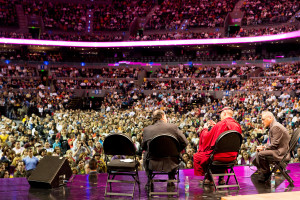
A final questioner asked if there is any hope for the world and His Holiness replied positively. He recalled meeting the English Queen Mother in 1996, and as she was as old as the twentieth century asked her if things had got better or worse in her lifetime. She declared unhesitatingly that they had improved; when she was young there was no talk of human rights or self-determination, ideas that are now universally accepted. Similarly, in the early twentieth century no one gave much thought to ecology which has become a major concern, nor to the gap between rich and poor or the use of natural resources. It’s when we imagine everyone wanting a car that we realise that our economic system is not sustainable, he said to applause from the crowd.
Tony Karam offered His Holiness thanks for coming again to Mexico and for generously speaking to people. He ventured to ask if he would come again and His Holiness replied:
“Your smiles and the warm feelings you’ve shown towards me are the actual invitation for me to come again.”
During the lunch break, His Holiness gave an interview to Lazaro Rios Cavazos of Reforma, Mexico’s largest newspaper. Among his questions he asked if relations with the Chinese government had improved since they last spoke two years ago. His Holiness told him that there was as yet no improvement but indications of potential improvement; signs that the new leadership takes a more realistic view.
His Holiness resumed his survey of Shantideva’s ‘Guide to the Bodhisattva’s Way of Life’ with the observation that there is no difference between the emptiness of the minds of sentient beings and the mind of the Buddha. Looking at chapter four he commented that we must remember the great value of human life and the immanence of death. We know we will die, but we don’t know when. All we can be sure of is that the only thing that will be of any help at that time is the strength of our spiritual practice.
In this context disturbing emotions like anger and craving are not like external enemies who openly attack us; they deceive and attack by stealth. Similarly, ordinary external enemies may change and at some time become friends, whereas there will never be a time when the disturbing emotions may do so. Disturbing emotions are our real foe. So, how do we counter them?
“When you are angry and full of hatred for someone, to meditate on love and compassion can take the sting out of it. But ultimately disturbing emotions are eliminated by the wisdom understanding emptiness.”
Chapter five concerns guarding the mind. We are advised to guard our minds as we would protect a wound when in a crowd. Moreover, we are counselled always to present a smiling face, to cease frowning, to be a friend to the world. There is nothing that the children of the Conqueror should not learn. For the good person who behaves in this way, there is nothing that is unwholesome.
Turning to chapter six and the practice of patience, His Holiness observed that we need to think about how we develop patience. We cannot do so in relation to the Buddhas, it is ordinary beings who provide us with the opportunity and consequently we should be grateful to them. An important part of the process involves coming to understand the advantages of patience and the drawbacks of succumbing to anger. If inflicting harm on others is how the foolish behave, then to turn our anger on them is as inappropriate as it is to be angry with fire for burning.
Since contrary beings assist us in following the bodhisattva’s way of life, we should regard them as like a treasure we discover in our house and acquire without effort. When it is objected that they have no intention to help us, so why give them such honour, the retort is that the Buddha dharma has no intention to help us either, and yet we treat that with honour.

